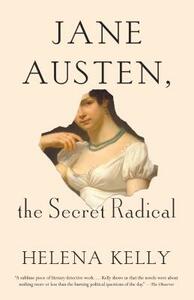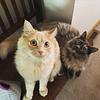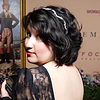Take a photo of a barcode or cover
At the beginning, the author warns that some Austen fans may not like this book. I'm one of them. It sounded good - an attempt to explore Austen's writings against the backdrop of her times and customs. But, the author goes beyond that with things that she reads into the books. Everyone does this but I prefer to "read into" the books on my own without someone else's (sometimes bizarre) ideas. So, I only got about a third of the way and put it down because I didn't want it to ruin the books which have been my friends since I was a child. I have always known that Austen's books were social commentary and not just romance novels and don't need it explained to me. Every time I read one I see something new and I decided I didn't want to "see" what this author was seeing. In fact, I get the impression that the author does not like Austen's books and is just trashing them.
Feel like I can't really rate this because I'm not exactly the target audience. I have only read one of Jane Austen's novels, have never studied any of her work or literature in any way, I have no knowledge of (or particularly strong interest in) history so it's probably a bit weird that I picked this up and read the whole thing. It did make me want to read most of the novels. Contrary to popular opinion, I actually liked the little fake vignettes about Jane's life; I didn't think they were hypocritical because I read them as tongue-in-cheek, like a bit of an in-joke with the reader. I liked Kelly's writing and enjoyed the arguments made although it was hard for me to know how much weight to give them without reading the texts themselves.
challenging
informative
slow-paced
If I could rate this with 10 stars I would. The author uncovers the layer just beneath the surface of Austen's well-known stories for the modern reader. Some themes I knew of, in the case of Mansfield Park's slavery issue, but Emma's enclosure acts was news to me. My favorite was the Sense & Sensibility chapter. I couldn't believe it, yet it is all there! Fascinating stuff, and so well researched.
The arguments made about Jane Austen's political leanings (spoiler: she's not a Conservative) are interesting and worth thinking about, whether you agree or not. However, the affectation of placing a fanciful, fictionalized scene from Austen's life at the beginning of each chapter, including the Introduction, is completely unnecessary and hypocritical after taking Austen biographers to task for creating saccharine, unsupported-by-evidence portraits of "our Dear Jane." The editor should had nixed those pages.
informative
reflective
medium-paced
What Janeite doesn't want to dive deeper into her works and find a hidden gem or two? We all want a new way to inhale her novels, or new insight into the rather mysterious woman herself.
This book gives us a whole lot of potential context for reading Austen. I say "potential" because not every hypothesized perspective came off as legitimate. I appreciate the immense research and detail put into this, but I do not feel every chapter was convincing. The Mansfield Park and Sense and Sensibility chapters felt strongest, but everything else came off very weak.
I appreciate the new info on her life and the era, but her "facts" on how to read Austen are questionable.
This book gives us a whole lot of potential context for reading Austen. I say "potential" because not every hypothesized perspective came off as legitimate. I appreciate the immense research and detail put into this, but I do not feel every chapter was convincing. The Mansfield Park and Sense and Sensibility chapters felt strongest, but everything else came off very weak.
I appreciate the new info on her life and the era, but her "facts" on how to read Austen are questionable.
I'm giving this two stars because I enjoyed reading the history of England at the time that Jane Austen lived and the world she was living in. If the author had stopped there and not gone on with her literary criticism, I would have given the book five stars.
It's a funny old book - it's thoroughly entertaining, it's made me reach for Pride and Prejudice again (which is always a good thing!), but I find many of the arguments very tenuous. I agree that many people undermine Austen, she is much shrewder than many give her credit for (I have never understood how you read P&P as a romantic comedy of manners and COMPLETELY miss the criticism of inheritance laws and the way women are reduced to chattel in the marriage game) but some of her arguments are barely supported by examples from the original texts.
That said, we are reading Emma for book club in the summer and I am going to be looking at Mr Knightley with a VERY critical eye as I found that chapter extremely persuasive!
That said, we are reading Emma for book club in the summer and I am going to be looking at Mr Knightley with a VERY critical eye as I found that chapter extremely persuasive!
I really liked the concept of this book: reading Jane Austen's books for signs of radical thought. I appreciated these readings, which I thought were generally quite convincing, if sometimes taken a bit too far in attributing motives to Jane from very little evidence. The topics are very interesting, especially the analysis of Catherine Morland as a lacking reader, as well as the exploration of Elizabeth Bennet and Fitzwilliam Darcy as a radical utopian relationship.
I thought it was a strange idea to be arguing against viewing Jane Austen as an idealised figure due to popular preconceptions and then make up scenes featuring her out of whole cloth, placing words and thoughts into her mouth which were not her own. I liked these scenes, but they seemed to be contradicting the point of the book in that they portray Jane not through her own words, but through words imposed on her by Helena Kelly.
Nonetheless, the book overall was interesting and well-written.
I thought it was a strange idea to be arguing against viewing Jane Austen as an idealised figure due to popular preconceptions and then make up scenes featuring her out of whole cloth, placing words and thoughts into her mouth which were not her own. I liked these scenes, but they seemed to be contradicting the point of the book in that they portray Jane not through her own words, but through words imposed on her by Helena Kelly.
Nonetheless, the book overall was interesting and well-written.







